Medical Cannabis: Help or Hindrance
I have used medical cannabis for four years, but I have to quit…
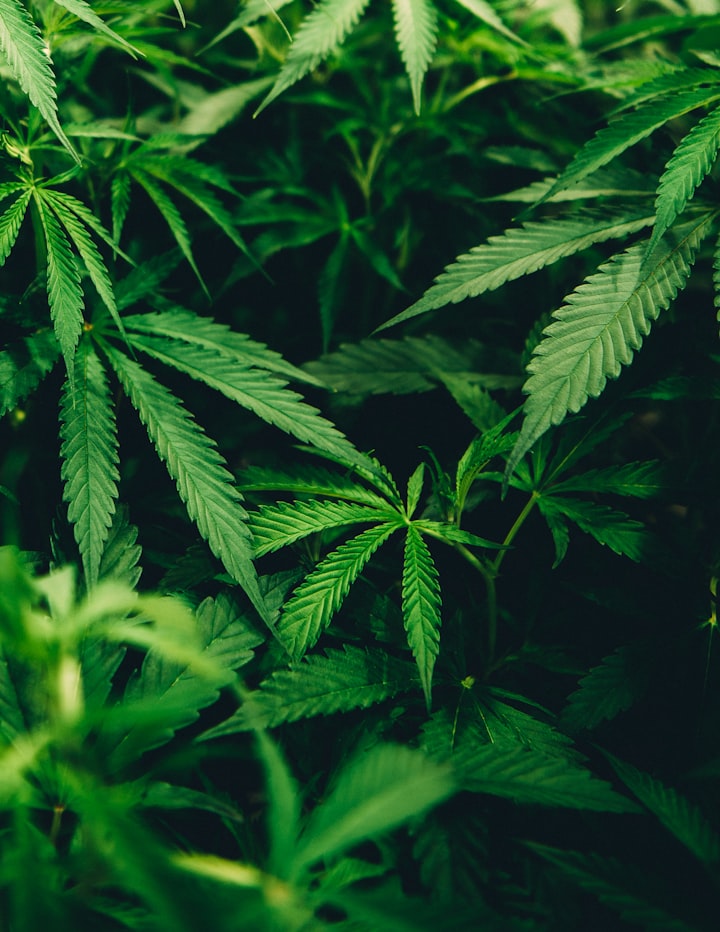
Throughout my life, I’ve had a strange relationship with cannabis. It was the first drug I had ever tried at age 13 (if you don’t count alcohol). The first few times I indulged, I didn’t get high. When I started getting high, I was having strange reactions. I cannot guarantee that the pot wasn’t laced with something else, but I’ve had experiences where I was vomiting profusely, my head was spinning and all I could do was lie down, and I even went completely blind for about 45 minutes after I took a few bong hits at a friend’s house when I was 15.
That being said, I want to emphasize that cannabis isn’t for everyone. I completely favor full recreational legalization on the federal level, but that’s not because I believe that everyone should be smoking pot. Cannabis is a relatively benign drug but in the wrong hands, it can exacerbate mental health issues, cause issues with memory, and interfere with teenagers’ brain development.
The federal government currently has marijuana as a Schedule 1 drug, the most restrictive of the five classes it uses to evaluate dangerous drugs. Schedule 1 drugs are described as having the greatest risk of abuse and offering no medical benefit and include drugs like heroin, ecstasy, and LSD.
This ranks cannabis as more addictive and dangerous than cocaine and amphetamines. It also denies cannabis’s potential to treat numerous physical and mental ailments. Advocates have been calling for the “rescheduling” of cannabis for years, but politics continue to interfere, even though science doesn’t line up with cannabis being a Schedule 1 drug.
The fact that cannabis remains on Schedule 1 increases the federal penalties for users and sellers and impedes meaningful scientific research to be done to determine how cannabis can be helpful in the medical field. For this reason, we still don’t know cannabis’s full capabilities.
In 2013, my fiancé of eleven years passed away. I was destroyed, as he was my soulmate and we had two boys together. The boys were 4 and 5 when he died, and I was a senior at Kutztown University in Pennsylvania. I soon realized I was not going to be able to keep moving forward because my mental state was so poor.
I immediately went to see my family doctor who then referred me to a psychiatrist’s office for therapy and medication. My symptoms were severe: I was extremely depressed, had intense anxiety, extreme restlessness, and horrific nightmares, and I just didn’t know what to do with myself.
I didn’t want to get out of bed anymore, but I was so restless that I couldn’t stay there either. I wasn’t even sleeping in our former bed. It hurt too much to lie down without him. I slept with my mom or my sister or sometimes on a chair in the living room. The first year after my fiancé died was probably the worst year of my life.
I had to take a leave of absence from school, and I couldn’t even think about a job because of my mental health. My psychiatrist started me off with an anti-depressant and an anti-anxiety pill. I was only supposed to take the anti-anxiety pills when I needed them, and they were helpful in times of desperation.

My anxiety was the worst symptom I had in the first year. I couldn’t be around other people, especially those who didn’t know that my fiancé had just passed, because I was crying constantly. My stomach was always in knots, and I was defecating sometimes more than ten times a day. My nerves were shot.
When the nightmares started, I was unprepared for the effect that they would have on my daily life. Sometimes I simply dreamt about my fiancé in normal times. Those dreams were comforting because I would wake up feeling like I was just with him.
Other times, I would have vivid, intense nightmares about my fiancé dying or about him trying to kill me. During the nightmares in which I was being attacked, I was always running from my fiancé for my life. He usually had a large knife that he’d use to slit my throat, but sometimes he brandished a gun and would shoot me in slow motion, as I desperately tried to avoid the barrage of bullets coming my way.
Eventually, I started to figure out how to get out of my nightmares. It didn’t work every time, but on certain occasions, I was able to realize that I was dreaming. It would usually occur when something really strange would happen and I’d ask myself out loud if I was dreaming. I then proceeded to smack myself in the face repeatedly and as hard as I could.
Sometimes it worked and sometimes it didn’t. But, for the most part, using this method, I’d be able to break out of the nightmare and wake up safely in my bed. I was having these nightmares about four to five times per week. They plagued me during the day, as I wasn’t able to shake the horrifying images that manifested in my mind, and they kept me from falling asleep as I was afraid of having more nightmares.
I reported my symptoms to my psychiatrist, and he prescribed a blood pressure medication called prazosin, which is supposed to help with nightmares and insomnia. I started taking it right away, hoping that it would give me the relief I so desperately desired.
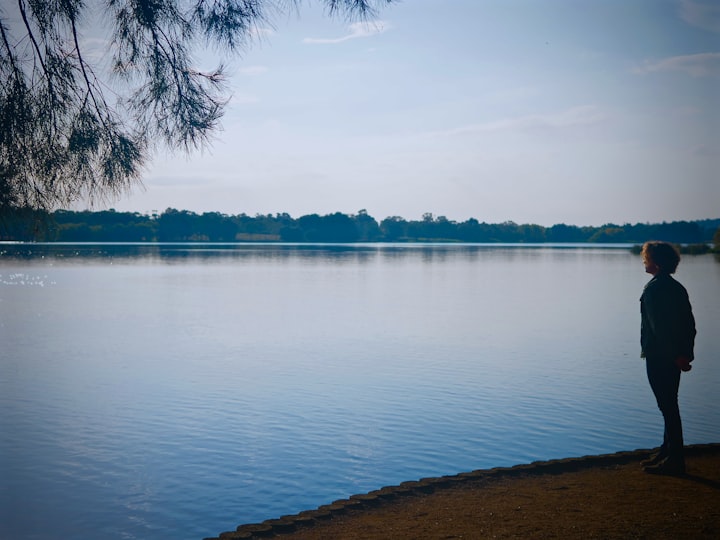
Unfortunately, the side effects of the medication prevented me from taking it for longer than two months. It made me feel lightheaded, dizzy, and sluggish. The nightmares continued.
A few months later, I was reading an article about medical marijuana and post-traumatic stress disorder. I read that THC, the psychoactive ingredient in cannabis, suppresses the user’s REM cycle, which is when dreaming occurs. I was in a desperate state and willing to try anything to relieve my mental anguish.
I spoke to my psychiatrist about medical cannabis, and he concurred that it could help me. Next, I went on the Pennsylvania Medical Marijuana Registry and got all the information I needed on finding a doctor, paying the annual fee for a card, and getting dispensary locations.
There were about a half dozen doctors in my area who were certified to prescribe medical cannabis. I found a doctor that specializes in sleep apnea issues along with prescribing marijuana for various physical and mental ailments.
When I initially went to the doctor for a prescription for marijuana, the only mental ailment that was approved for use was post-traumatic stress disorder (PTSD), with which I was diagnosed. This has since changed in Pennsylvania.
More mental disorders are now eligible for cannabis treatment, including anxiety disorders, autism, and opioid addiction. In 2018, Pennsylvania was the first state to offer medical marijuana to heroin and opiate addicts to help them get clean.
After visiting the doctor and paying my annual fee (it costs $50, but you can pay $25 if you’re on Medicaid or SNAP), I waited patiently to get my card in the mail. Once that happened, I drove to the nearest dispensary and met with a “pharmacist” who was there to teach me about medical marijuana and what kinds of strains would be good for PTSD, nightmares, and anxiety.
There are three types of cannabis: indicas, sativas, and hybrids. Indicas produce more mellow, body highs and are usually preferred at night. Sativas tend to have a more energetic high, which can be good to use during the day. Hybrids offer a combination of both. I always preferred indicas, as sativas could sometimes make me paranoid, which is what I was trying to rid myself of in the first place.
There are many different forms of marijuana at the dispensary. I chose to mainly use cartridges, which I would vape, and RSO, which is a thick oil that can be consumed orally by itself or can be used to make cannabis edibles, such as pot brownies.
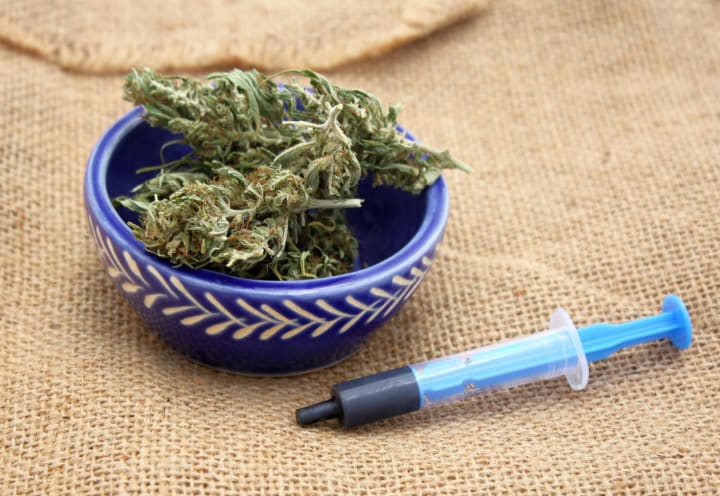
The first time I vaped, it was nothing like the horrible experiences I had in my youth. I felt absolutely lovely as if I was floating on a cloud of euphoria. My anxiety was wiped away and I was finally able to calm down. I started vaping twice a day but soon switched to only at night because I found that I wasn’t a good day vaper.
I would get tired and lethargic when I vaped during the day and felt the need to take a nap. I felt that I received the most benefit when I vaped at night, as the primary reason for getting this prescription was my nightmares. I was also taking other medication for anxiety that worked fairly well in the moments when I felt weak.
After a few weeks of using cannabis vapes daily, I realized that I hadn’t experienced any nightmares! The cannabis was working, and I felt so relieved that I didn’t have to go through the sheer terror I felt at night, and I wasn’t plagued throughout the day by memories of the graphic images my mind was conjuring up in my nightmares. Unfortunately, marijuana isn’t without negative side effects…
About nine months before I started using medical marijuana, I started on a weight loss journey. At my heaviest, I was 354 lbs. After my fiancé died in 2013, I initially lost 30 lbs. in the first three months afterward. As soon as I gained my appetite back, I began using food for comfort. I am a recovering heroin addict. I am an addict to my core. Any time I find something from which I can derive pleasure, I overuse it until it starts to cause damage in my life. And even then, I don’t often stop.
I also had a habit of using food for comfort in prison and I feel like it stuck with me. I would buy all kinds of junk food from the prison commissary and eat it at night in my bed while I read my book. I found myself replicating this habit at home. It didn’t take long for me to blow up to 354 lbs.
My new psychiatrist decided that my weight was probably contributing to my depression and sent me for blood work. We found out that I’m borderline diabetic and have high cholesterol. I also now have high blood pressure. At 39 years old, I wasn’t expecting to have these issues.
I started dieting by intermittent fasting and doing the bare minimum of exercise. By the time I went to see my doctor for medical marijuana, I went from 354 lbs. to 287 lbs. I felt like I was on the right track to reaching my goal of 160 lbs.
I was NOT prepared for the munchies. From the very first day I used cannabis, I had ridiculous cravings for food — mostly sweets and chocolate, but I could eat just about anything after vaping or using RSO. At first, I was gaining a pound or two and losing them again in the same week.
Then, I stopped caring and went back to 323 lbs. It took me a few months of dwelling in my misery to realize that I didn’t want to live this way. I started having pain in my lower back when I would stand or walk for a long period. I couldn’t even walk two blocks without feeling the pain in my back.
So, once again, I started trying to lose weight. This was in February of 2021. Initially, I did really well and dropped down to 289 lbs. I was almost at the weight I was when I started medical cannabis.
But then Thanksgiving and Christmas came around and I started cheating on my diet. Mainly, my problem was eating at night after I consumed cannabis. I also noticed that the cannabis wasn’t working for me like it did in the beginning.
My nightmares were still reduced. While on cannabis, I was only having two to three nightmares a month. This was a wonderful thing for me. I felt like I was released from the prison of my mind. But instead of calming my anxiety, the cannabis was making me paranoid and restless.
I always treated marijuana as a hallucinogen in that I would follow the basic rules of tripping: don’t use when you’re in an unfamiliar place or with people with whom you don’t feel comfortable; don’t use when you’re in a really bad emotional space; NEVER drive after using; don’t use more than you need.
But even when following those basic rules, I was still experiencing trouble. My tolerance was growing rapidly, and even strains that were 80–85% THC were not doing it for me. I couldn’t get high! I was told to take a break from it and come back a few weeks or a month later, but I was afraid to do that because the nightmares would surely return.
Some nights, the only reason I knew that I had vaped was that I was feeling paranoid. Nighttime was the worst time for anxiety for me anyway. Sometimes I stay up worrying about existential questions, stressing about my loved ones abandoning me, and fretting over what would become of me once my kids turned 18 and left for college. When I realized that the cannabis was starting to exacerbate my condition, I knew something had to be done.
After laying out the cold, hard facts:
The cannabis is giving me insane cravings for food that I cannot resist.
Cannabis is agitating my anxiety more often than not.
I couldn’t continue to spend exorbitant amounts of money on it month after month. I didn’t even get into the cost of maintaining a cannabis prescription, but it’s important to note that health insurance doesn’t cover it, and it’s not cheap to use cannabis medicinally or recreationally.
One cartridge, which would usually last me 3–4 days, cost anywhere between $38-$65. Cresco, the brand with which I felt the most comfortable, costs about $50-$55 per cartridge. One syringe of RSO costs $70, but I don’t use those very often, so it’s hard to say if it’s worth the price. Based on my knowledge of pricing and other marijuana products, I assume that it’s equally as ridiculous and expensive as cartridges.
Many dispensaries have discounts for veterans and people on SNAP (food stamps). For some reason, they only give the discount to people on SNAP — not to people on Medicaid or TANF (welfare). The discounts are usually 10%–15% off of their total order.
Also, most dispensaries run daily sales on their products. They may have a sale that consists of 20% off of all cartridges or flower (actual marijuana flower) and sometimes they’ll give up to 30% off of anything in the store. Because of how expensive it was, I only purchased cannabis on days when they held storewide discounts of 25% off or higher.
With the consequences starting to outweigh the benefits, I decided to stop using cannabis, at least for now. I can’t continue to ignore my health and hope that it will turn itself around. I’m getting to the age where I need to pay more attention to what I’m putting in my body.
Just to be clear, this is not a hit piece on medical cannabis. One thing that people must know about cannabis is that it affects everyone differently. For some reason, cannabis just does not work well for certain people. I encourage those people and anyone under 25 whose brain is not yet fully developed to stay away from marijuana.
But medical marijuana can be a lifesaver for certain people who have various physical and mental ailments. Especially those who have cancer and don’t have an appetite or people with chronic pain who were previously taking dangerous and addictive prescription opiates. I also applaud Pennsylvania for making it legal for opiate addicts because it can help people get off of heroin and other prescription drugs.

Right now, I’m finishing up my final stash of cannabis. I admit that my inner fiend has been emerging and I’ve been going through old cartridges to look for any that I hadn’t completely finished. Do I feel like I’m addicted to marijuana? No, I don’t think so. I know what addiction feels like. I am a former heroin addict. This isn’t it.
I don’t feel like I did when I finally went to a methadone clinic to kick heroin. I don’t feel desperate or hopeless. I’m simply making a good decision that will benefit my health in the long run. I don’t know if I will experience any mental withdrawal symptoms, but I’m prepared for them if I do. I am connected to enough resources that I can make it through if it gets difficult.
I hope to give everyone an update when I’ve completely stopped using cannabis and starting to lose weight again. I truly hope that my nightmares won’t return, but I’ll deal with them as they come. I’m ready to move forward in a positive direction.
About the Creator
Monica Leigh French
Student. Writer at www.medium.com/@MonicaLeighFrench. I’m mostly inspired by writing about personal experiences, politics, addiction, and mental health issues. Pink Floyd fanatic. Twitter: @french_monica.


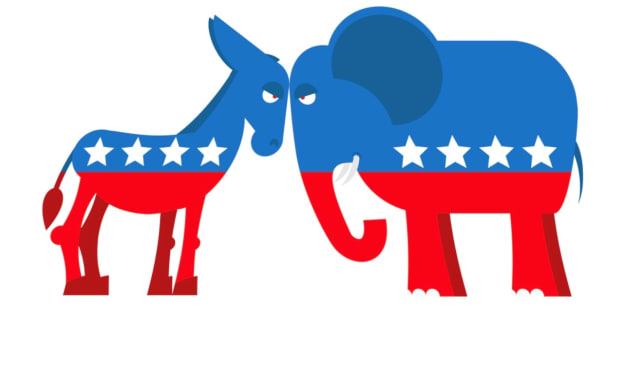
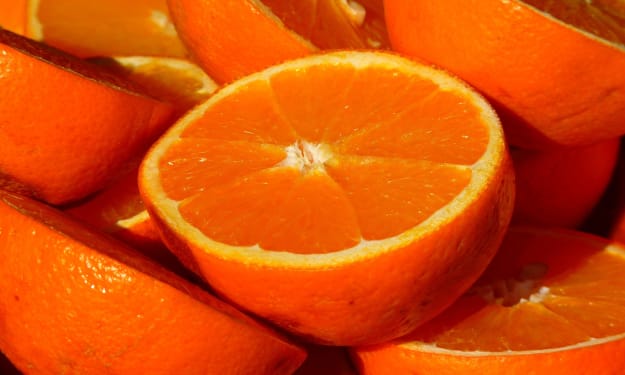


Comments (1)
I hope things have gotten better for you. I see a comment on my story about gender identity in my email, but I do not see it on my story, so I can't reply to you on it. That is strange. I can't imagine your pain, and I really hope you are better. Your children too must have had a hard time of it. Embrace and cherish them, best of luck with dealing with and accepting their choices in life. I hope you have a strong support system. Thanks for reading my article.